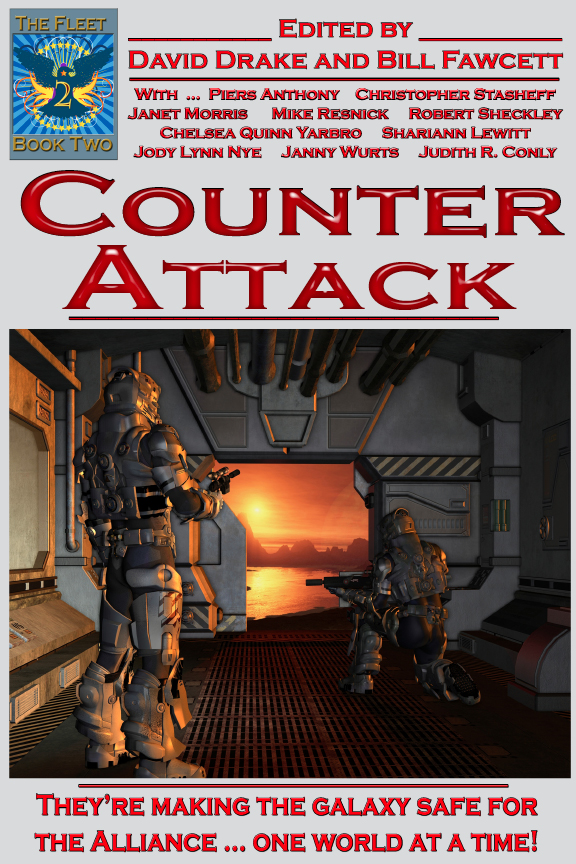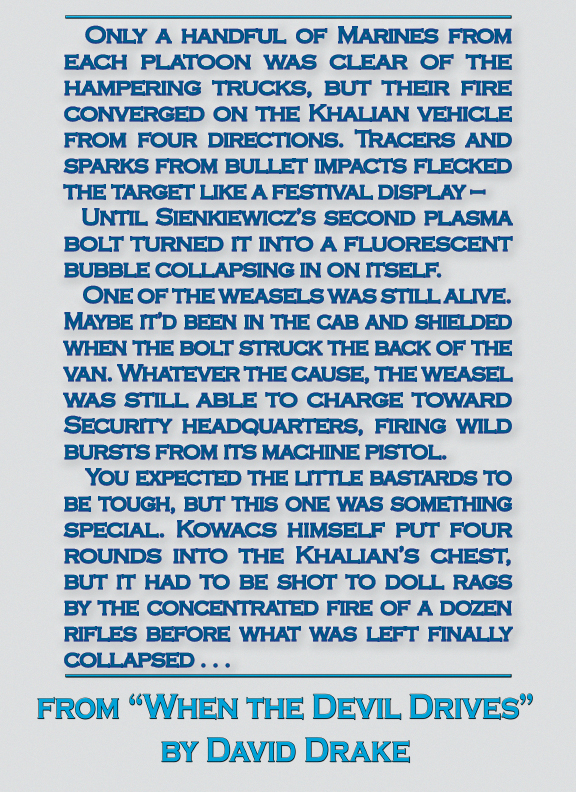The Fleet Book 2: Counter Attack
Read The Fleet Book 2: Counter Attack Online
Authors: David Drake (ed),Bill Fawcett (ed)







“THEY BROUGHT THEIR
slaves with them, eh?”
“Yes, sir—from a dozen different species, at least.” Major Dromio laid a stack of reconnaissance pictures on the desk in front of Admiral Vancouver. “Our Khalia have been busy boys.”
The admiral nodded, his mouth a grim line. “Pirates have always taken prisoners for slaves. Well, we won’t add ourselves to their trophy case.” He frowned down at the reconnaissance pictures, each one showing a clothes-wearing animal tagging along after a Khalia. “The scout made it back in one piece?”
“Yes, sir. If they found out he was there, they didn’t even try to do anything about it. Not a single shot.”
The admiral nodded. “Well, we can’t be sure. That might have alerted them, and they might be waiting to sucker us in. When we hit, we’ll hit fast, Dromio.” He pointed at one of the pictures. “This one here?”
“Yes, sir. The computer analyzed all the pictures and found slaves of this race in ninety-three percent of them—ninety-eight percent of all the ones that had sentient beings in them. There are more of them than of all the other slave species put together—22.7 times more, the computer says.”
The admiral frowned at the picture of the alien, foreshortened by altitude. It was squat and humanoid, but covered with a bright coat of many colors. “Why would the Khalia have brought so many of that one species?”
Dromio shrugged. “Must be damn good servants.”
“Or victims.” The admiral slid the pictures back into a pack and squared it on the desktop. “Tell the troops to avoid shooting civilians if they can, Major.”
“Yes, sir.” The Major’s mouth tightened as though he’d tasted something unpleasant. “It won’t be easy. They’re all over the place.”
The admiral shrugged. “There will always be a few civilians caught in the crossfire. Just keep their numbers down.” He set the pictures aside and pulled over the meter-wide view of the provincial capital. A smile creased his face. “Well. How nice of them to make it easy for us. All the important buildings stand out like sunflowers in a cornfield.”
Dromio winced at the homeliness of the simile. “Not quite all, sir. There’s one of the timber and stucco structures that has a flock of antennas on top.”
“Yes, and a transmitting tower next to it. Must be the communications center.” The admiral pursed his lips as he studied the blowup. “I would have thought the Khalia would have tried to update their homes a bit more. After all, they’ve been stealing enough currency to buy all the construction equipment they want.”
“Yes, sir. Intelligence’s guess is that they devoted all their resources to expanding their navy. They only put up a new building when it was absolutely necessary.”
“Yes, it’s not as though they had invented the FTL drive themselves. That’s still the best guess, isn’t it?”
“Guess,
yes—that they stole the FTL drive—or impounded it—from a spacer that had to make an emergency landing.”
The admiral’s shoulders shrugged with amusement. “Why not? Those thieves have stolen everything else they’ve ever come across.”
“Yes, sir. The xenologists are pretty sure their culture hadn’t moved past pre-industrial when they found it.”
The admiral nodded. “No, of course their buildings would still be frame and stucco. So detail your best troops to take the state-of-the-art buildings.”
“Yes, sir. The power plant’s an old one, though.”
“Odd.” The admiral frowned. “I’d expect them to keep updating power stores. Maybe they have some respect for tradition . . . well, send in the regiment from Cirwat. If those city tigers can’t take it, no one can;”
“Yes, sir. How about the com center?”
The admiral shrugged. “No need for anything heavy; the Khalia seem to be naturally authoritarian. They won’t know it’s important.” He touched the array of antennas with a forefinger. “I want that platoon from Galath detailed to take it. Half of them are electronics techs.”
“Half of everybody is, on Galath—and the other half are still in school. What else can you make but circuit gear, when your only natural resource is sand?”
* * *
“. . . and Fedor’s platoon will take the com center.” Captain Rakoan looked up from the map and around at the faces of his lieutenants. “Any questions?”
They were quiet for a moment. Beyond them, the assault troops shifted restlessly, muttering to one another and chewing mild stimulants. A few were trying to keep card games going, but their hearts weren’t in it.”
The blond boondock woman straightened up “looking determined” and Rakoan braced himself. “Lieutenant Morna?”
Lutane Morna looked him square in the eyes. “You don’t really think we should do this, do you, sir?”
The question took Rakoan by surprise—questioning orders was unheard of, especially when battle was minutes away. “Whether
I
think we should is beside the point, Lieutenant! Just take your Galathians down to Bay Four and get them ready to take that com center!”
“Sir.” Lutane pulled a brace and saluted, her face wooden.
Rage flared in Captain Rakoan at the covert defiance, especially aboard a destroyer on its way down to drop them in the assault zone. He almost reminded’ her that her beloved Galath had sold her and her squad down the river
when it sent them to the Fleet, and she would blasted well do as she was told or be blasted, period—but he managed to catch his temper at the last second and remembered what a last-minute showdown could do to morale. The important thing was to get Lieutenant Morna and her platoon to do the job, not to make her blindly obey. He converted his blast of rage into a sigh of resignation. “No, Lieutenant, we don’t have total information about Target. But we’re pretty sure it’s the Khalia’s home world, even if we don’t
know.
We do have reconnaissance pictures up to our gills, and that’s almost as good as having a spy on the ground. Which we can’t have, of course.”
“No, sir.” Lutane shifted uncomfortably. “We don’t have anyone from any of the species that are down there, sir.”
“No, we don’t.” Rakoan shrugged. “So what do we do, Lieutenant? Stand around doing nothing, while the Khalia gut ship after ship and leave them to drift into port with cargoes of corpses?”
“Well, of course not! But . . .”
Rakoan waited.
“ . . . we do what we can with the information we’ve got,” Lutane finished lamely.
“And attack Target,” Rakoan concluded. “But since we both know we don’t know enough, Lieutenant, be on the watch for surprises, eh?”
Lutane straightened. “Yes, sir!”
“Particularly surprises from the squat humanoids with the feathery scales.” Rakoan scanned the faces of all his lieutenants. “Intelligence says they’re slaves—but if they are, the Khalia brought one hell of a lot of ‘em!”
“Yes, sir.” Lutane felt her insides loosen with relief; somebody else had noticed! “What else could they be?”
“Allies.” Rakoan’s face hardened. “And it
could
be that everyone of those featherheaded fetchers is a veteran soldier, ready to jump your troops the second their backs are turned!”
“And ready to jump the Khalia if they see an opening?”
Lutane’s eyes glowed.
“Maybe,” Rakoan said slowly. “Maybe we
can
divide and conquer—but we don’t know that, yet. And our assault might just make them pull even more tightly together. So watch your back, Lieutenant!”
“Yes, sir!” But Lutane frowned. “So we really ought to try to learn more before we go in?”
Rakoan closed his eyes and counted to ten. Then he said, “Maybe we should. But the admiral says we’re going in now, so we’re going in now! Because for you, Lieutenant, the Fleet may be just an exciting place to visit—but for me, it’s home! And my world and my universe, too, so whatever the admiral says, I’ll do! And so will you, because I’ll be right behind you and your fellow lieutenants when we hit the dirt! Understand?”
“Sir!”
“All right.” Rakoan straightened into a brace. “Go tell your platoons what they’re doing. Dis
-miss!”
The lieutenants stiffened, saluted, and turned away to their troops. For her part, Lutane went with determination—Rakoan had voiced her own doubts, and answered them. In spite of her questions, she knew what it was like landing an assault force on the enemy’s ground; she’d joined up when the Nietszean rebels had tried to take over Galath, and had been in on the end of it, chasing them back to their home province and going in to mop up their army and bring in the ringleaders. So she also knew what it was like to have every civilian turn out to be a soldier in retirement, or a soldier in training.
The floor lurched, and Lutane grabbed at it stanchion, waiting till the floor and her stomach settled. Her gaze darted to her troops, and she saw, with a glow of pride, that not one of them had landed on the floor. She let go of the stanchion and went on to them.
“Plasma bolt, sir?” Darby asked as she came up.
Lutane nodded. “They missed, though, sergeant.”
One of the troopers brayed a laugh, quickly smothered; Lutane glared at him, then turned back as Darby said, grinning, “Reckon so. An they’d’a hit us, we’d’a heard it.”
“Or felt it,” a corporal muttered.
“We won’t,” Lutane snapped. “Our computer’s got the records of a hundred battles like this one in it. But if we’re close enough to feel the shock waves from their bolts, we’re close to landing, too. Stand to!”
The men and women stood, grim-faced, shouldering their packs and checking their weapons. Lutane walked down their line, glance flicking over each soldier from head to toe, checking to be sure all was in order. It was, and she felt that glow of pride again. She came back to the center of the line just as the boat lurched again and caught the stanchion just in time to save herself from the embarrassment of a tumble in front of her platoon. She recovered and said, just loudly enough to be heard above the noise of other platoons getting ready, “Okay. There’s no point in my giving you a pep talk; you know why we’re here. You’ve all heard how many ships the Khalia have taken, and what they’ve done to the people on them. Don’t expect any mercy from them, and don’t give any, either-—they’ll surrender, sure, but they’ll stab you in the back if they get a chance. Just hit hard, and keep hitting.”
Then she was quiet, glaring at the hatch in front of them.
After a moment, her troops began muttering to one another. Somebody laughed, quietly, and Lutane felt an impulse to pray. In the nick of time, the transport hit dirt.
It hit gently, as such things go, but flexed knees and handholds were all that kept the soldiers from slamming to the deck. A crash behind them told them that one veteran wasn’t as salted as he’d thought.
Then the hatch dropped away from them, and Lutane shouted, “Out!”
They shot out of the transport and hit the dirt in a semicircle as slugs peppered the hull behind them and troops slammed out of the transport all around its perimeter. It helped a little, knowing that three other transports were landing at the compass points around the city, so that the enemy couldn’t devote its full attention to any one of them. It helped, but not much.
Then the transport’s cannon began roaring, and Lutane shouted, “Now!” Her platoon surged to their feet and charged out under the transport’s covering fire.
They hatched out of their egg like a thousand dragons, spawn of death spewing streams of bullets before them. The company spread out in a wave, firing at all and any near them in the city square. Khalia answered fire from the rooftops and doorways. Here and there a ricochet struck home, and a Khalian soldier toppled out with a death shriek almost too high to hear, but just right for abrading Terran nerves. The slaves were caught in the open and fell like stones—and they were all featherheads. Lutane felt her heart sink, but shot forward with her platoon. “Watch out!” she barked as they came up near a fallen featherhead. “It might be armed!”
Delacroix stitched the body with a stream of bullets.
Lutane caught her breath; it hadn’t been necessary. Or had it? But then they were beyond the corpse and charging in among the shadows of the houses, and she cried, “Halt!”
A rifle barked overhead, and one of her soldiers screamed, falling.
“Doorways!” Lutane shouted, and the platoon jammed into nooks and crannies. Something snapped, and the back of Lutane’s nook crashed open, spilling soldiers onto a wooden floor. Lutane whipped about, rifle up and ready, covering her troops.
It was a sparsely furnished, almost bare room, but lighter areas on the walls showed where ornaments had been. All that was left now was a table and chairs, massively built and plain, but rubbed to a gloss. The featherheads around it were scrambling to their feet, backing away, two small ones, a medium-sized one, and a wide one, spreading his hands out, trying to cover the other three who retreated behind his bulk, cowering against a wall. Lutane couldn’t read his facial expressions.
“Lieutenant,” Gorman asked, “do they always shiver like that?”
“I don’t know any more about them than you do, Gorman,” she answered, “and I don’t think any of our people do.”
“I don’t see any weapons,” Olerein said.
